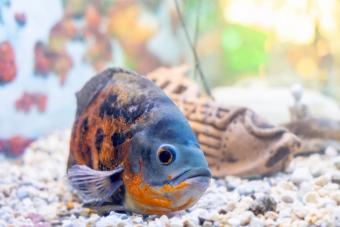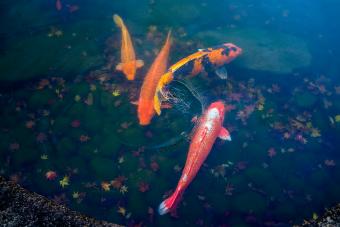
Oscar fish, a type of cichlid, are properly known by their scientific name, Astronotus ocellatus. Although these fish are not particularly fussy about food, keeping their environment clean is an essential part of Oscar fish care.
Oscar Fish Care Guide
Like all tropical fish, Oscars require clean, fresh water in their tanks and proper food. Oscars in particular require a good quality filtration system. They also have additional requirements because of their large size and strength.

Choosing the Aquarium for Proper Oscar Care
Oscars are among the largest freshwater fish that average hobbyists have a chance of keeping successfully, and it's not uncommon for them to grow up to 18 inches long. Because they can become very big, you will need an aquarium that accommodates them comfortably.
Ethan Mizer, advanced aquarist and LoveToKnow pet editor, states that Oscars, "grow rapidly, and can reach nearly 10 inches after around a year of growth." He encourages fish owners to "plan ahead" to ensure their aquarium allows enough room for Oscars as they mature.
- Tighter quarters can lead to overcrowded and unsanitary conditions, which in turn can lead to disease. Err on the side of caution and choose the largest tank size you can afford.
- Plan to keep a single fish in a 75-gallon aquarium, or two Oscars in an aquarium with a volume of at least 100-gallons. Any more than two Oscar fish require a 200-gallon tank or larger. If this sounds excessive, keep in mind that these large fish need room to move and swim freely.
- Be sure to place your aquarium on a sturdy stand or table and in a location where you can access your fish and enjoy watching them.
- Make sure the tank and stand are completely level. An uneven tank puts extra pressure on the side panel seals, which can lead to leaks.
Add a Good Quality Filtration System
A high-quality filtration system is absolutely essential for all home aquariums, but it's especially important for Oscar systems. This is due to the large volume of waste they generate, also known as their bioload.
A three-stage filtration system is essential for your Oscar fish habitat. There are three components involved in this complex system.
- Mechanical filtration. This involves equipment components situated at the filtration water intake or early in the filtration loop that physically strain and remove waste through the aquarium filter. Some aquarium filtration systems involve solely mechanical filtration, but this is not adequate for many fish.
- Chemical filtration. A second step involves adding media to the filtration system that is chemically reactive. Aquarists use these media to remove harmful compounds from aquarium water. Activated charcoal is a classic example of chemical filtration media, and many systems use it for this purpose. Chemical filtration media typically becomes saturated with unwanted compounds after use, and must be replaced regularly to be effective.
- Biological filtration. The most complex yet critical method involved in aquarium filtration systems is biological filtration. Fish routinely create ammonia during respiration and excretion. Unless steps are taken to break ammonia down to less toxic chemicals -- namely nitrites and nitrates -- it can quickly build up and kill fish. Fortunately, biological filtration converts harmful ammonia and nitrite into less-toxic nitrate. This is accomplished by leveraging the power of good bacteria in the filter to break down ammonia and nitrite. The resulting nitrates are still dangerous if levels are too high, so routine water changes are necessary to export this final waste product from the system. In this case, bacteria is beneficial to your fish.
Ideal Water Conditions for Oscars
Ammonia and nitrite levels must be monitored closely, as Oscar fish are sensitive to pollutants. Mizer mentions, "If nitrites rise above 20 parts per million, Oscars will suffer." Try to maintain nitrite levels no higher than 10 ppm. However, it is best to keep nitrite levels as close to zero as possible. Nitrite test kits are available to monitor your tank's conditions.
Your goal with any aquarium should be to maintain the tank in the same conditions your fish would encounter in the wild. Oscar fish require a water pH between 6 and 8. Use a cichlid buffer or a water conditioner formulated for cichlid fish, and use an aquarium water pH test kit to measure water pH.

Temperature for Oscar Fish
Remember that Oscar fish come from warmer, tropical climates. Maintain temperatures between 75 to 80 degrees Fahrenheit -- ideally around 77 degrees for optimal conditions. You can do this by using an aquarium heater set to the proper temperature.
Avoid glass heaters as Oscars have been known to break them. Shatterproof aquarium heaters are available that work well in Oscar aquariums.
Lights and Tank Hoods Are a Must for an Oscar Tank
Oscars can jump and have been known to leap to their deaths out of an open-top aquarium. To avoid this scenario, be sure to confirm your aquarium is secure.
- Purchase a light fixture and hood attachment that fits snugly and securely over the top of the aquarium.
- Employ a glass top or plastic hood to enclose the aquarium.
- Make sure that the flaps on the tank hood have a latch on them, or use bricks to hold them down. Oscars can actually open them if they bang into the aquarium hood while jumping.
Prevent Oscars From Jumping
One trick to prevent Oscars from jumping is to keep the underside of your tank hood and lids meticulously clean. In the wild, insects and plant debris land in the water, which creates a ripple that attracts the fish to the area. It's like a dinner bell ringing for them. In captivity, moisture dripping from the underside of the tank hood or bits of fish food stuck to the hatch can fool an Oscar into thinking a meal has arrived. By keeping the hood clean and latched, you can keep your fish where you want them and where they need to be -- in the tank!
Add Gravel, Plants, and Accessories
One of the most fascinating aspects of keeping Oscar fish is their habit of rooting among the accessories in their tanks. They can easily lift out plants and even move rocks across the aquarium floor. Like their namesake, Oscar Madison in The Odd Couple, they are the messy fish in the aquarium. Don't be surprised if they dig trenches in the substrate, move your carefully positioned plants, and otherwise change their tank.
Since this behavior can get expensive, especially when they pull up live plants, consider adding artificial plants to the aquarium. Your Oscar won't mind. Mizer also recommends anchoring decor within the aquarium by securing them to the tank bottom prior to adding substrate, or gluing them directly to the tank.
Feeding Oscar Fish
There are a variety of different options to choose from when it comes to what to feed your Oscar fish. It's best to select a complete commercial diet specifically created for cichlids, which typically come in a pellet form. Although these balanced formulas provide your Oscar with all the requirements they need, many owners choose to supplement their Oscars' diet with additional food or treats.
It's important to know that Oscars and many other cichlids are omnivorous. Therefore, you can feed your Oscar fruits or vegetables such as green peas or small pieces of apple. Many owners also offer their cichlids frozen, dried, or live bloodworms and mealworms. These food sources can be a great compliment to a balanced commercial diet, but be sure that your source offers clean live foods free of parasites and diseases.
Although Oscars eat live food in the wild, many modern hobbyists avoid offering live feeder fish in the aquarium setting. These feeders can carry parasites or diseases that may harm your Oscars and, ultimately, your entire tank environment. If you do choose to offer your Oscars live feeder fish, first confirm that they are high-quality, healthy specimens.
Also remember that what goes in must come out, and Oscars are notorious for generating a high volume of waste. Avoid feeding your Oscar too much food to prevent the buildup of uneaten food and excess waste. Offer only as much food as they can finish within 5 minutes twice daily, and make sure to remove uneaten food promptly to prevent it from rotting. This means you have to observe your Oscars eating, but this is a good way to spend time with your fish, and also helps ensure you notice any health problems or other issues before they become serious.
Oscar Fish Personality Traits
Mizer states that Oscar fish "display a lot of personality," making them a popular choice for many fish enthusiasts. "They often appear to recognize and respond to their owner, and some aquarist even describe them as puppy-like," he reports. Many Oscars will even allow their owners to hand-feed them. Note that these social fish can become bored and depressed without enough attention, so engaging with them is essential.
Although intelligent Oscars can be affectionate with their owners, they are not communal fish. In fact, they have a well-deserved reputation as being aggressive toward other fish and aquatic life. For this reason, many hobbyists elect to keep tanks dedicated to their Oscars.

Ideal Tank Mates for Oscars
If you are considering whether an Oscar would be a good choice for your tank, it's important to evaluate other species you have or may wish to have in your aquarium. Due to their aggressive nature, Oscar fish "are not safe in nearly all community aquariums," according to Mizer. "Any fish small enough to fit in an Oscar's mouth is too small to be in the same tank with an Oscar."
Among the short list of potential tank mates for Oscars include other cichlids, such as the green terror and Jack Dempsey. However, it's not uncommon for Oscars to still become aggressive and fight with these fish species, potentially even to the death. Adequate volume and hiding spots within your aquarium are critical if you elect to introduce Oscars to tankmates. You must also observe how these fish behave together, and separate them if you find they are behaving aggressively.
Enjoy Your Oscar Fish
Oscars are among the most long-lived aquarium fish when given the right habitat. Choose a roomy aquarium, provide a good filtration system, and feed them the proper diet. This will help ensure that you'll be able to enjoy your beautiful fish for a long time to come.







